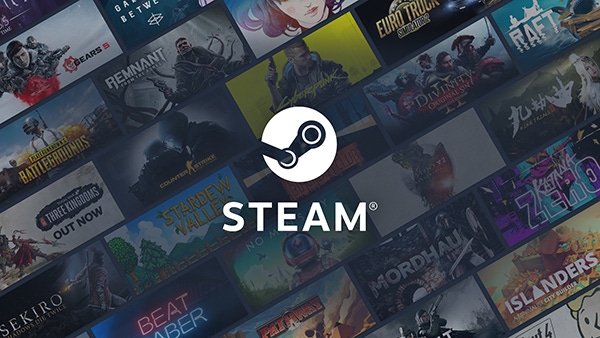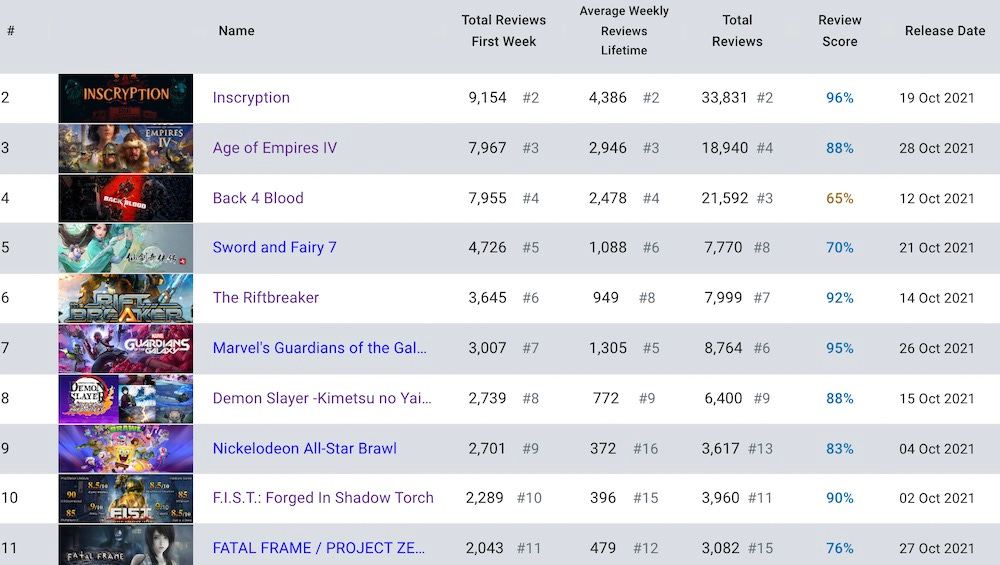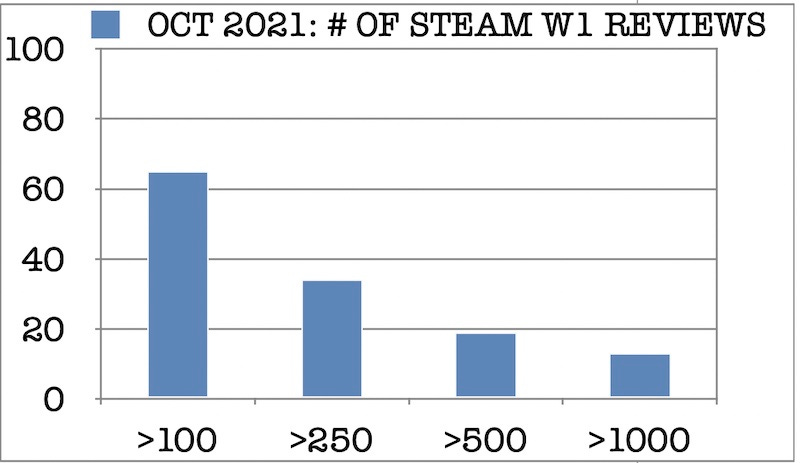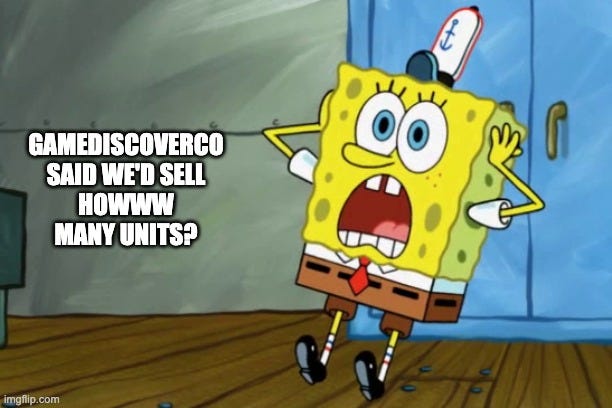
Featured Blog | This community-written post highlights the best of what the game industry has to offer. Read more like it on the Game Developer Blogs or learn how to Submit Your Own Blog Post
Game devs: what's your chance of success in today's market?
Working out the chances of doing gud on Steam.

[The GameDiscoverCo game discovery newsletter is written by ‘how people find your game’ expert & GameDiscoverCo founder Simon Carless, and is a regular look at how people discover and buy video games in the 2020s.]
We’re almost there! Welcome to the final working week before the 2021 Xmas holidays start kick in for most of us. And it’s rainy and damp here in Northern California, which makes a nice change from the regular semi-drought issues.
But up here on the information superhighway, data flows smoothly - no matter the moisture content of your clouds. (Wait, is that a ‘cloud computing’ joke? Not sure, but it is now!) So let’s get on and analyze a month of Steam launches for takeaways, eh?
Can we quantify chances of success on Steam?

So, we’re a little enchanted with our recently launched Steam post-release data (explained here & fully browsable for Plus subscribers!) And one thing is does help with is quantifying and comparing first week - and longer term - success by Steam review count.
So we thought we’d take a look at October 2021’s ‘brand new games launching on Steam’ - 964 in total. Above is the top 10 paid games by first week Steam review count - featuring hits like Inscryption, Back 4 Blood and The Riftbreaker. (The top-reviewed game, excluded because it’s F2P, is fast-follow Squid Game pastiche Crab Game.)
Because we’ve tracked the first week of reviews, no matter when the game launched, we can do things we haven’t seen done before. In particular, here are the number of games with certain thresholds of Steam Week 1 reviews for the month:

So, taking each of these four thresholds and commenting on them individually:
Out of 965 games released in October 2021, a total of 65 (around 6%) got more than 100 Steam user reviews in Week 1. And if we say that the reviews/sales ratio is around 40, then those games (in theory) sold at least 4,000 copies in their first week on sale.
However, only 34 of those new releases (around 3.5% of all releases) got more than 250 Week 1 user reviews in October. Those titles - very roughly - sold at least 10,000 units, not taking into account refunds - in their first week. (More on refunds and net/gross soon!)
Next step up? Around 19 of those games (around 2% of all releases) scored more than 500 Steam reviews in their first week on sale. Those folks sold at least 20,000 units just in their first week, if we go by rough median - pretty good going!
Finally, on the top end, 13 debut games - including some of the big hits pictured above, and around 1.5% of all Steam releases for the month - had more than 1,000 Steam reviews for the month. This implies a first-week sales total of 40,000 units or more.
We can go further - in the abstract - in trying to work out what this means for these games’ short and longer-term performance. Our incredibly rough spreadsheet from a recent newsletter shows those 65 games with at least a 4,000 unit Week 1 (at $15 average worldwide sales price) will get you $35,000 USD net after the end of the first week. This takes into account sales taxes, Steam cut, refunds, etc. That becomes $105,000 net at the end of Year 1, using some basic multipliers.
Extrapolating these numbers for the higher tiers: 34 of the new games in October 2021 will make $260,000 net or more in their first year, 19 will make $520,000+, and 13 will make $1.05 million+ - and many of those will make multiple millions, of course.

So there’s a whole bunch of ways to read this and start panicking/not panicking (above). And - please don’t panic! Here’s some thoughts from us on it:
Firstly, bear in mind that many of these titles cost a lot more - or a lot less - than $15 average worldwide sales price. Review to sales ratio can be as low as 1:20 and as a high as 1:60. So this really is hideously extrapolated. But it’s what we’ve currently got, and it’s better than nothing.
If you’re a new game entering this battlefield, you’ll find that the top spots can be full of existing IP or big licenses. Only 3 or 4 out of the top 13 games with >1,000 Week 1 reviews in October 2021 would be counted - in our book - as brand new original IP with no previous interest. (Less so with lower rankings.)
Finally, don’t forget that if you get an ‘evergreen’ title, you can sell incredibly well over time. And you can add free updates, paid DLC, perhaps IAP, and all kinds of things to boost revenue. Looking at Skul: The Hero Slayer and ignoring its ‘vote for me in the Steam Awards’ review boost, that game looks like it’s selling 25,000+ copies per month on Steam, nearly two years after launch.
But yes, unless you have a publisher paying for your game who is balancing risk across multiple titles, small self-published indie titles should probably not spend millions on making a game. (Unless you’re confident you can be one of the top couple of hundred new Steam titles in any given year, or can do very well across console revenue/subscription deals, of course.)
What this brief data crunch further convinced me is that the sweet spot, risk-wise, is definitely in the low hundreds of thousands of USD in this space. Whether it’s getting more risky is… something we’re going to try to evaluate over time. And look - it’s not easy to succeed with higher-budget titles. But it’s still definitely possible.
[We’re GameDiscoverCo, a new agency based around one simple issue: how do players find, buy and enjoy your premium PC or console game? We run the newsletter you’re reading, and provide consulting services for publishers, funds, and other smart game industry folks.]
Read more about:
Featured BlogsAbout the Author(s)
You May Also Like







.jpeg?width=700&auto=webp&quality=80&disable=upscale)








